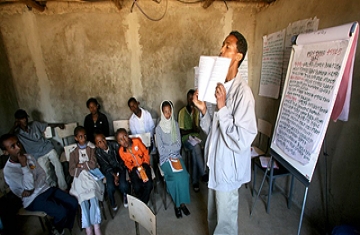
Above: An education charity in Addis Ababa, Ethiopia.
Source: Telegraph

By: Alice Klein
Feb 6, 2009
Recent news that the Ethiopian government has cracked down on charities which receive funding from overseas should be a major cause for concern.
The Charities and Societies Act states that any organisation receiving more than 10% of its funding from abroad is a “foreign NGO” (non-governmental organisation).
In Ethiopia, a country where approximately a quarter of the population live on a dollar a day, charities inevitably struggle to raise funds domestically and subsequently look overseas.
According to the Guardian, organisations like the Ethiopian Human Rights Council and the Ethiopian Women Lawyers Association depend on foreign money by up to 90%.
But criminalising charity work appears to be the latest in a string of efforts to crack down on any form of dissent in the East African country.
Censorship of media is already rife. Last summer saw the Mass Media and Freedom of Information Proclamation passed in the House of Peoples’ Representatives, drafted without consultation from journalists or legal experts.
Some say the changes are in nervous preparation for next year’s election but regardless of intention, it is drawing worrying parallels with heavily censored countries such as Zimbabwe where Zanu PF passed the Access to Information and Protect of Privacy Act in 2002.
The law saw foreign news organisations banned and many domestic publications shut down including The Zimbabwean, which is now edited by the charismatic Wilf Mbanga in England and printed in the UK and South Africa.
The few journalists that remain must be licensed, registered and pay a huge fee only to have every cough and spit heavily monitored.
If Ethiopia’s conflict with Somalia continues, it is vital that independent media be able to report on it (unlike in Zimbabwe) and that humanitarian charities remain active…even if their funding comes from western donors.

























